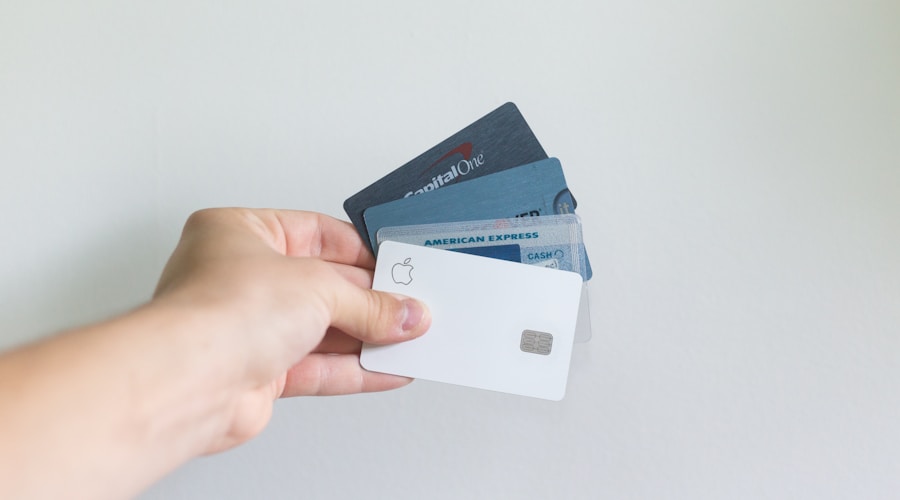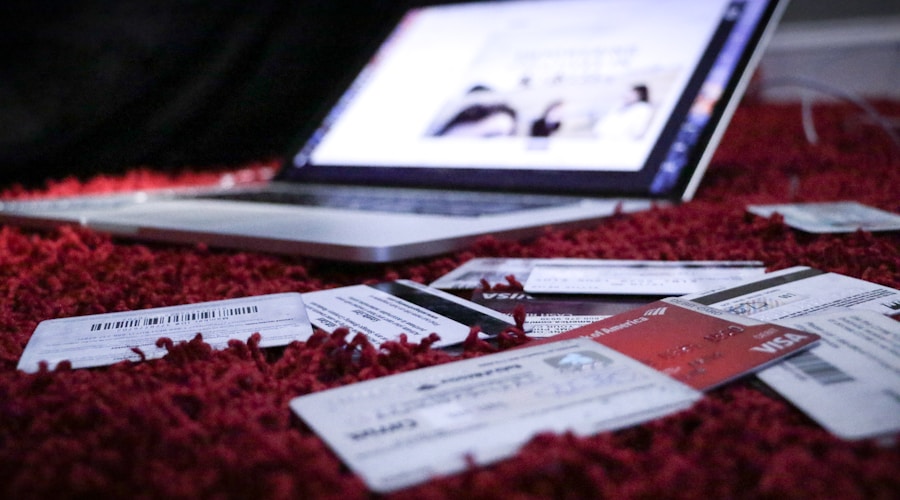Are you ready to take the next step towards financial independence? Getting your first credit card can be both exciting and daunting. It opens up a world of opportunities, but it also comes with great responsibility. Before diving into the world of credit cards, it is crucial to understand how they work and how to choose the right one for you. In this article, we will guide you through the process of selecting and using your first credit card responsibly. So, buckle up and get ready to embark on this financial journey!
Understanding Credit Cards
Credit cards can be powerful financial tools if used responsibly. However, they can also lead to debt and financial trouble if misused. Understanding how credit cards work is crucial before applying for your first one.
How do Credit Cards Work?
A credit card is a plastic card that allows you to borrow money from a bank or credit card issuer to make purchases. The issuer sets a credit limit, which is the maximum amount you can borrow. Each time you use your card, you are essentially borrowing money from the issuer, which you must repay within a specified time-frame to avoid paying interest.
Why Should You Have a Credit Card?
Having a credit card offers several benefits. One of the most significant advantages is building a credit history. Timely repayments and responsible credit card use can establish a positive credit history, which is vital for future financial opportunities like getting a loan or renting an apartment1 .
A credit card also provides convenience and flexibility. It allows you to make purchases online and in-store, book travel accommodations, and handle emergencies, even when you don't have cash on hand. Additionally, credit cards often come with additional perks, such as reward points, cashback offers, and travel insurance.
Common Credit Card Terms
To understand credit cards better, familiarize yourself with the following terms:
Credit Limit: The maximum amount you can borrow on your card.
Interest Rate: The cost of borrowing money on your credit card if you don't repay the full balance within the grace period.
Minimum Payment: The lowest amount you must pay each month to keep your account in good standing.
Grace Period: The time between the purchase date and the due date, during which you can pay your balance in full without incurring interest charges.
Annual Fee: A yearly fee charged by some credit card issuers for using their card.
"Getting Your First Credit Card: How to Choose and Use It Responsibly"

The Importance of Having a Credit Card
Having a credit card is more than just a convenient way to make purchases. It actually plays a vital role in your financial life. Here's why:
Building Credit: One of the main benefits of having a credit card is that it helps you build a credit history. Establishing a good credit history is important because it determines your creditworthiness. Lenders, landlords, and even potential employers often look at your credit history to assess how responsible and reliable you are with money. As financial expert Suze Orman puts it, "A good credit rating is paramount in personal financial success".
Access to Credit: Having a credit card gives you access to credit when you need it most. In emergencies or unexpected situations, having a credit card with a sufficient limit can provide a financial safety net. As Warren Buffett, one of the world's most successful investors, once said, "If you don't have a credit card, you're not going to be able to do anything".2
Convenience and Flexibility: Gone are the days of carrying around wads of cash or writing checks everywhere you go. With a credit card, you have the convenience of making purchases with just a swipe or a tap. It also allows you to shop online, book flights, and rent cars. Credit cards provide the flexibility to pay off your expenses over time, based on your financial situation.
Rewards and Perks: Many credit cards offer rewards programs, cashback incentives, or travel perks. By using your credit card responsibly, you can earn points or cashback on your everyday purchases, making it an added bonus. As financial adviser Dave Ramsey says, "If you're going to spend the money anyway, you might as well get something for it"3 .
Protection and Security: Credit cards provide additional protection when making purchases. They offer fraud protection, allowing you to quickly dispute unauthorized charges. Most credit cards also provide extended warranties and purchase protection, giving you peace of mind when buying expensive items.
In summary, having a credit card is not just about convenience; it has significant benefits that can positively impact your financial life. It helps you build credit, provides access to credit in emergencies, offers convenience and flexibility, and rewards you for your spending. As Warren Buffett advises, "Credit cards can be a huge plus if you use them responsibly"2 .
Steps to Choose Your First Credit Card
Choosing your first credit card is an exciting milestone in your financial journey. However, with so many options available, it can be overwhelming to decide which card is right for you. Here are some steps to help you make an informed decision:
Evaluate your needs and goals: Before you start comparing credit cards, take a moment to assess your needs and financial goals. Are you looking for a card to help you build credit? Or do you want one that offers rewards or cash back? Understanding your priorities will guide you in selecting the right card for yourself.
Research and compare: Once you have a clear idea of what you're looking for, it's time to research and compare different credit cards. Look for cards that align with your needs and offer the features and benefits you want. Pay attention to interest rates, fees, credit limits, and any additional perks.
Check your credit score: Your credit score plays a crucial role in determining the type of credit cards you qualify for. Before applying for a card, check your credit score. Knowing your credit score will make it easier for you to identify cards that are suitable for your current credit standing.
Consider your spending habits: Take a moment to reflect on your spending habits and determine how you plan to use your credit card. If you intend to pay off your balance in full every month, a card with no annual fee might be the best option for you. However, if you anticipate carrying a balance, look for a card with a low-interest rate.
Compare credit card rewards: One of the benefits of having a credit card is earning rewards. Different cards offer various types of rewards, such as cash back, travel points, or discounts on specific purchases. Consider the types of rewards that align with your lifestyle and spending habits.
Review the terms and conditions: Before finalizing your decision, carefully review the terms and conditions of the credit card you are considering. Pay attention to the annual percentage rate (APR), grace period, late payment fees, and any other terms that may impact your financial well-being.
Read reviews and seek advice: To get a better understanding of a credit card's pros and cons, read reviews from other cardholders. Additionally, seek advice from people you trust, such as friends or family members who have experience with credit cards. Their insights can help you make a more informed decision.
Apply for your chosen card: Once you have compared and considered all your options, it's time to apply for your chosen credit card. Be prepared to provide the necessary documentation and information required during the application process.
Remember, choosing your first credit card is an important decision that can have long-term effects on your financial journey. By following these steps and taking the time to understand your needs, you can make a confident choice that suits your financial goals and helps you build a positive credit history.
As personal finance expert, Dave Ramsey, said, "Don't just get the first credit card that's offered to you. Think about what you want, what is right for you, and how you plan to use it. Make an informed decision, and you'll set yourself up for success in the long run."

Benefits of Using Your Credit Card Responsibly
Using your credit card responsibly can bring several advantages to your financial life. Here are some of the benefits:
1. Convenience and Security
One of the primary benefits of using a credit card is the convenience it offers. With a credit card, you don't have to carry around a lot of cash. Instead, you can make purchases with just a swipe or a tap. This not only saves you from the hassle of counting and carrying cash but also provides a more secure way to make transactions.
2. Building a Positive Credit History
Using your credit card responsibly allows you to build a positive credit history. Paying your credit card bill on time and in full each month demonstrates to lenders that you are a responsible borrower. This can be crucial when you need to take out a loan for a car or a mortgage in the future. Lenders will review your credit history to assess your creditworthiness, and a positive credit history gives you a better chance of getting approved and getting favorable loan terms.
3. Earning Rewards and Bonuses
Many credit cards offer rewards programs that allow you to earn cash back, airline miles, or points for every dollar you spend. By using your credit card responsibly and paying off your balance in full each month, you can take advantage of these rewards and bonuses. They can add up over time and provide you with significant savings or even a free flight or hotel stay.
4. Consumer Protection
Credit cards offer better consumer protection compared to other payment methods such as cash or debit cards. If you encounter fraud or unauthorized charges on your credit card, federal law limits your liability to $50, and most credit card issuers have zero liability policies, so you won't be held responsible for fraudulent charges. Additionally, if you have a dispute with a merchant over a purchase, you can contact your credit card issuer and file a dispute. They can withhold payment to the merchant until the issue is resolved.
5. Emergency Expenses
Having a credit card can provide a safety net for unexpected or emergency expenses. Whether it's a medical emergency or car repairs, having a credit card can help you cover these costs without depleting your savings or taking out a high-interest loan. It provides peace of mind, knowing that you have a backup plan in case of unforeseen circumstances.
Using a credit card responsibly has numerous benefits. It offers convenience, security, and can help you build a positive credit history. Rewards and bonuses give you the opportunity to save money or enjoy perks, while consumer protection safeguards your purchases. Additionally, having a credit card provides a safety net for emergency expenses. Remember, using your credit card responsibly means paying your balance in full each month, managing your spending, and staying within your budget.
Possible Risks of Misusing a Credit Card
Using a credit card can be a convenient and helpful tool for managing your finances, but it's essential to understand the potential risks associated with misusing it. Here are some risks you should be aware of:
Accumulating Debt: One of the most significant risks of misusing a credit card is the potential to accumulate excessive debt. It's easy to overspend when using a credit card because you don't see the immediate impact on your bank account. This can lead to a cycle of debt if you're unable to pay off your balance in full each month.
High Interest Rates: Credit cards typically come with high-interest rates, especially if you have a poor credit score. If you carry a balance on your credit card, you'll end up paying interest on the outstanding amount. This can quickly add up and make it challenging to pay off your debt.
Credit Score Impact: Misusing a credit card can have a negative impact on your credit score. Late payments, maxing out your credit limit, or defaulting on your credit card payments can lower your credit score significantly. A poor credit score can make it harder for you to access credit in the future.
Identity Theft and Fraud: Another risk of misusing a credit card is the potential for identity theft and fraud. If you're not careful with your credit card information, fraudsters can steal your card details and make unauthorized purchases. This can lead to financial loss and pose a significant inconvenience.
Impulse Spending: Having a credit card can make it easier to give in to impulse purchases. The convenience of just swiping your card can tempt you to buy things you don't really need or cannot afford. This can result in overspending and financial strain.
To avoid these risks, it's crucial to use your credit card responsibly. Be mindful of your spending habits, create a budget, and only charge what you can afford to pay off in full each month. Monitor your credit card statements regularly for any suspicious activity and report any unauthorized transactions immediately. By being responsible and cautious, you can enjoy the benefits of a credit card while minimizing the potential risks. As financial expert John C. Bogle said, "Use your credit card as a convenience and follow a simple rule: pay off the balance in full every month."

Tips on How to Use Your Credit Card Prudently
Using a credit card can be a powerful tool to build your credit history and enjoy the conveniences of making purchases without cash. However, it's crucial to use your credit card responsibly to avoid falling into debt and damaging your credit score. Here are some tips to help you use your credit card prudently:
Pay your balance in full and on time: When you receive your credit card statement, make it a priority to pay off the entire balance by the due date. By doing so, you avoid accruing interest charges and maintain a good credit score. As financial expert Suze Orman puts it, "Paying off your credit card balance in full every month is the key to keeping your finances in check."
Stay within your credit limit: Your credit card comes with a predetermined credit limit, which represents the maximum amount you can borrow. It's crucial to keep your credit utilization ratio—the amount you owe compared to your credit limit—low. Aim to use no more than 30 percent of your available credit, as exceeding this limit may negatively impact your credit score. As financial advisor Ramit Sethi advises, "Aim to keep your credit utilization below 30 percent, and you'll be in good shape."
Track your spending: Keeping tabs on your credit card spending is essential to stay on top of your finances and prevent overspending. Make use of your credit card issuer's mobile app or online banking system to monitor your transactions regularly. Financial journalist Jean Chatzky recommends reviewing your credit card statement monthly to "catch any unauthorized charges and identify excessive spending habits".
Avoid unnecessary fees: Credit cards often come with various fees, such as annual fees, balance transfer fees, and cash advance fees. Read the fine print of your credit card agreement and understand the fees associated with your card. By being aware of the potential charges, you can avoid unnecessary expenses and save money in the long run. As personal finance expert Dave Ramsey advises, "A little research right now can save you a lot of money down the road."
Be cautious with new credit card offers: While it may be tempting to apply for multiple credit cards to take advantage of sign-up bonuses or rewards programs, be mindful of the impact on your credit score. Each time you apply for a new credit card, it triggers a hard inquiry on your credit report, which temporarily lowers your credit score. Financial planner Liz Weston cautions, "Each hard inquiry typically dings your score by a few points, and multiple inquiries can add up fast."
By following these tips, you can use your credit card responsibly and reap the benefits of having good credit. Remember, responsible credit card use is an ongoing commitment that requires discipline and financial awareness. As Suze Orman wisely says, "A credit card doesn’t control you. You have the choice to make it work for you."
Instructions to Build and Maintain a Good Credit Score
Building and maintaining a good credit score is crucial for your financial future. A good credit score can help you qualify for loans, get lower interest rates, and even land you your dream job. So, how can you build and maintain a good credit score? Here are some instructions to get you started:
Pay your bills on time: One of the most important factors in determining your credit score is your payment history. Make sure to pay all your bills, including credit card bills, loans, and utilities, on or before the due date. Late or missed payments can have a negative impact on your credit score.
Keep your credit utilization low: Credit utilization refers to the amount of credit you are using compared to your total credit limit. It is advisable to keep your credit utilization below 30%. For example, if your total credit limit across all your credit cards is $10,000, try not to use more than $3,000. High credit utilization can indicate financial instability and negatively affect your credit score.
Maintain a diverse credit mix: Having a diverse credit mix can positively impact your credit score. This means having a mix of different types of credit accounts, such as credit cards, loans, and a mortgage. Lenders like to see that you can manage different types of credit responsibly.
Avoid opening too many new accounts: While it is important to have a diverse credit mix, too many new accounts can be seen as a sign of financial instability. Each time you apply for new credit, it results in a hard inquiry on your credit report, which can temporarily lower your score. Only open new accounts when necessary and avoid opening multiple new accounts within a short period.
Monitor your credit report regularly: It is essential to keep a close eye on your credit report to ensure accuracy and detect any fraudulent activity. You can obtain a free copy of your credit report every year from each of the three major credit bureaus. Review your report for any errors and dispute them promptly. Monitoring your report regularly helps you stay informed and take necessary actions to maintain a good credit score.
Remember, building and maintaining a good credit score takes time and discipline. It is crucial to develop responsible credit habits and stick to them. As financial expert, Suze Orman, advises, "The best way to build your credit is to be responsible with it. Pay your bills on time, keep your balances low, and only open new accounts when necessary".
So, start building your credit score today and set yourself up for a strong financial future.

Conclusion
Choosing the right credit card for your needs and spending habits is the first step towards responsible credit card usage. Researching and comparing different options will enable you to find the card that offers the best terms, rewards, and interest rates. Once you have obtained a credit card, it's crucial to use it prudently. As renowned investor Warren Buffett advises, "Only buy something that you’d be perfectly happy to hold if the market shut down for 10 years."
To use your credit card responsibly, it's important to pay your bills on time, keep your credit utilization ratio low, and avoid unnecessary debt. As financial journalist Jean Chatzky suggests, "Think of credit cards as a form of plastic cash. If you don't have the money now, you won't have it next month either." By following these guidelines and consistently making responsible financial decisions, you can build and maintain a good credit score, which will open up future opportunities for loans, mortgages, and other financial endeavors. As business magnate J. Paul Getty once said, "If you owe the bank $100, that's your problem. If you owe the bank $100 million, that's the bank's problem."
2Suze Orman, "The Money Book for the Young, Fabulous & Broke" (2007).
3Warren Buffet, 2017 Berkshire Hathaway Annual Shareholders Meeting.
4Dave Ramsey, "The Total Money Makeover" (2003).
5Dave Ramsey, Financial Peace (1992)
6John C. Bogle, The Little Book of Common Sense Investing (2007)
7Suze Orman, "The Money Book for the Young, Fabulous & Broke" (2007)
8Ramit Sethi, "I Will Teach You to Be Rich" (2009)
9Jean Chatzky, "Money Rules: The Simple Path to Lifelong Security" (2012)
10Dave Ramsey, "The Total Money Makeover" (2007)
11Liz Weston, "Your Credit Score, Your Money & What’s at Stake" (2019)
12Suze Orman, Women & Money: Owning the Power to Control Your Destiny (2007)